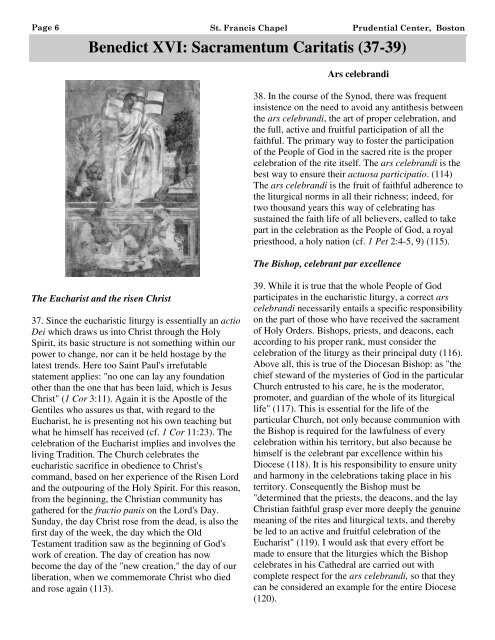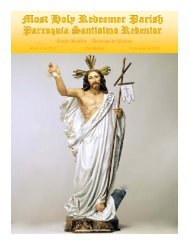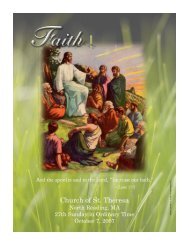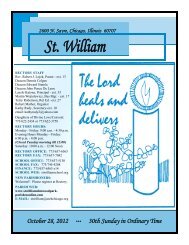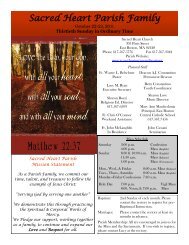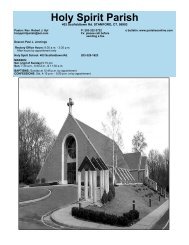S T . F R A N C I S C H A P E L
S T . F R A N C I S C H A P E L
S T . F R A N C I S C H A P E L
You also want an ePaper? Increase the reach of your titles
YUMPU automatically turns print PDFs into web optimized ePapers that Google loves.
Page 6 St. Francis Chapel Prudential Center, Boston<br />
Benedict XVI: Sacramentum Caritatis (37-39)<br />
The Eucharist and the risen Christ<br />
37. Since the eucharistic liturgy is essentially an actio<br />
Dei which draws us into Christ through the Holy<br />
Spirit, its basic structure is not something within our<br />
power to change, nor can it be held hostage by the<br />
latest trends. Here too Saint Paul's irrefutable<br />
statement applies: "no one can lay any foundation<br />
other than the one that has been laid, which is Jesus<br />
Christ" (1 Cor 3:11). Again it is the Apostle of the<br />
Gentiles who assures us that, with regard to the<br />
Eucharist, he is presenting not his own teaching but<br />
what he himself has received (cf. 1 Cor 11:23). The<br />
celebration of the Eucharist implies and involves the<br />
living Tradition. The Church celebrates the<br />
eucharistic sacrifice in obedience to Christ's<br />
command, based on her experience of the Risen Lord<br />
and the outpouring of the Holy Spirit. For this reason,<br />
from the beginning, the Christian community has<br />
gathered for the fractio panis on the Lord's Day.<br />
Sunday, the day Christ rose from the dead, is also the<br />
first day of the week, the day which the Old<br />
Testament tradition saw as the beginning of God's<br />
work of creation. The day of creation has now<br />
become the day of the "new creation," the day of our<br />
liberation, when we commemorate Christ who died<br />
and rose again (113).<br />
Ars celebrandi<br />
38. In the course of the Synod, there was frequent<br />
insistence on the need to avoid any antithesis between<br />
the ars celebrandi, the art of proper celebration, and<br />
the full, active and fruitful participation of all the<br />
faithful. The primary way to foster the participation<br />
of the People of God in the sacred rite is the proper<br />
celebration of the rite itself. The ars celebrandi is the<br />
best way to ensure their actuosa participatio. (114)<br />
The ars celebrandi is the fruit of faithful adherence to<br />
the liturgical norms in all their richness; indeed, for<br />
two thousand years this way of celebrating has<br />
sustained the faith life of all believers, called to take<br />
part in the celebration as the People of God, a royal<br />
priesthood, a holy nation (cf. 1 Pet 2:4-5, 9) (115).<br />
The Bishop, celebrant par excellence<br />
39. While it is true that the whole People of God<br />
participates in the eucharistic liturgy, a correct ars<br />
celebrandi necessarily entails a specific responsibility<br />
on the part of those who have received the sacrament<br />
of Holy Orders. Bishops, priests, and deacons, each<br />
according to his proper rank, must consider the<br />
celebration of the liturgy as their principal duty (116).<br />
Above all, this is true of the Diocesan Bishop: as "the<br />
chief steward of the mysteries of God in the particular<br />
Church entrusted to his care, he is the moderator,<br />
promoter, and guardian of the whole of its liturgical<br />
life" (117). This is essential for the life of the<br />
particular Church, not only because communion with<br />
the Bishop is required for the lawfulness of every<br />
celebration within his territory, but also because he<br />
himself is the celebrant par excellence within his<br />
Diocese (118). It is his responsibility to ensure unity<br />
and harmony in the celebrations taking place in his<br />
territory. Consequently the Bishop must be<br />
"determined that the priests, the deacons, and the lay<br />
Christian faithful grasp ever more deeply the genuine<br />
meaning of the rites and liturgical texts, and thereby<br />
be led to an active and fruitful celebration of the<br />
Eucharist" (119). I would ask that every effort be<br />
made to ensure that the liturgies which the Bishop<br />
celebrates in his Cathedral are carried out with<br />
complete respect for the ars celebrandi, so that they<br />
can be considered an example for the entire Diocese<br />
(120).


